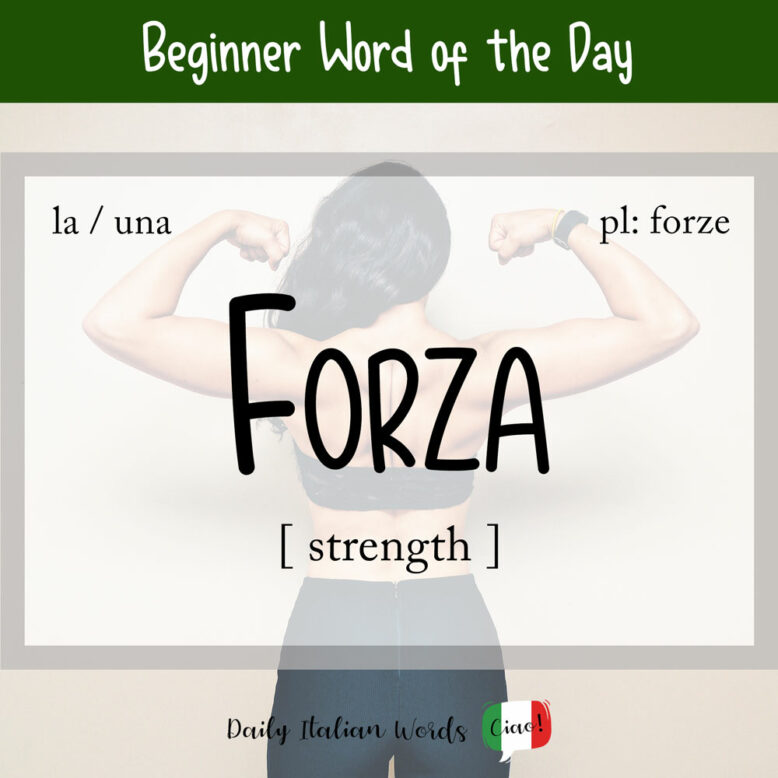The word for strength in Italian is forza (feminine, plural: forze).

As you can see from the two examples below, it can refer to strength in both the physical and mental sense, just as in English.
Abbiamo lottato valorosamente ma la forza dell’avversario era superiore.
We fought valiantly but the opponent’s strength was superior.
Andrea è un caso unico. Ha una forza mentale enorme.
Andrea is a unique case. He has enormous mental strength.
Italians use the word forza a lot in expressions that describe strength, violence, power or will:
- perdere o riacquistare le forze = to lose or regain strength
- ottenere qualcosa con la forza = to obtain something with violence
- farsi forza = to encourage yourself, to find your own strength
- forza di volontà = willpower
- la forza dell’immaginazione = the power of imagination
Another equally valid translation is force which, as the spelling reveals, shares the same origins as forza.
La Luna ha una forza di gravità inferiore a quella della Terra.
The Moon has a force of gravity inferior to that of the Earth.
The plural form of these words is used when referring to military troops in either language.
Le Forze Armate sono al servizio della Repubblica.
The Armed Forces serve the Republic.
Forza is contained within the verb forzare meaning to force or compel someone to do something, to force something open (like a tin can or a lock), or to strain or stress something (like your muscles).
Non voglio essere forzato a fare questa scelta.
I don’t want to be forced to make this choice.
A very useful expression in Italian that lacks an exact English equivalent is a forza di. The closest translation would be by continually / persistently doing something. It can be used for both positive and negative outcomes, such as passing an exam through persistent study (positive) or gaining weight by continuing to eat excessive amounts of chocolate (negative).
A forza di studiare, ho superato l’esame.
By (continually) studying, I passed the exam.
Another expression that will help you sound like a fluent Italian speaker is per forza. Once again, there is no exact English translation. It is usually said to convey a feeling of annoyance or anger when being compelled to do something against your will.
Devi studiare stasera? – Sì, per forza. Ho un esame domani.
Do you have to study tonight? – Yes, I don’t really have a choice. I have an exam tomorrow.
You can also use it sarcastically when you feel someone is stating the obvious.
Ti piace questo film? – Per forza, c’è Charlize Theron!
Do you like this film? – Well of course, there’s Charlize Theron!
A few other commonly used expressions featuring forza include:
- a viva forza = by force, forcefully
- con forza = strongly, firmly, vigorously
- giocoforza = inevitable
- per forza di cose = inevitably
- punto di forza = strong point
- forza lavoro = workforce
The entire Star Wars (Guerre Stellari) saga revolves around a metaphysical and ubiquitous power known as the Force. In Italian, the Force is also known as la Forza and the popular phrase “May the Force be with you” translates as “Che la Forza sia con te“.
Finally the word forza on its own can be called out during a sports event to cheer on an athlete or team. It is similar to saying Come on! or You can do it! in English.
Forza ragazzi! Manca poco alla fine!
Come on, guys! You’re almost at the end!
Forza Azzurri! is a popular expression used to encourage the national Italian team at a sports competition. Find out more about the word azzurro here.
Idioms containing the word ‘forza’
Per amore o per forza
Literal translation: for love or for strength
English meaning: one way or the other
O per volere o per forza
Literal translation: either by will or by force
English meaning: by hook or by crook
Causa di forza maggiore
Literal translation: cause of force majeure
English meaning: due to extenuating circumstances
Heather Broster is a graduate with honours in linguistics from the University of Western Ontario. She is an aspiring polyglot, proficient in English and Italian, as well as Japanese, Welsh, and French to varying degrees of fluency. Originally from Toronto, Heather has resided in various countries, notably Italy for a period of six years. Her primary focus lies in the fields of language acquisition, education, and bilingual instruction.


